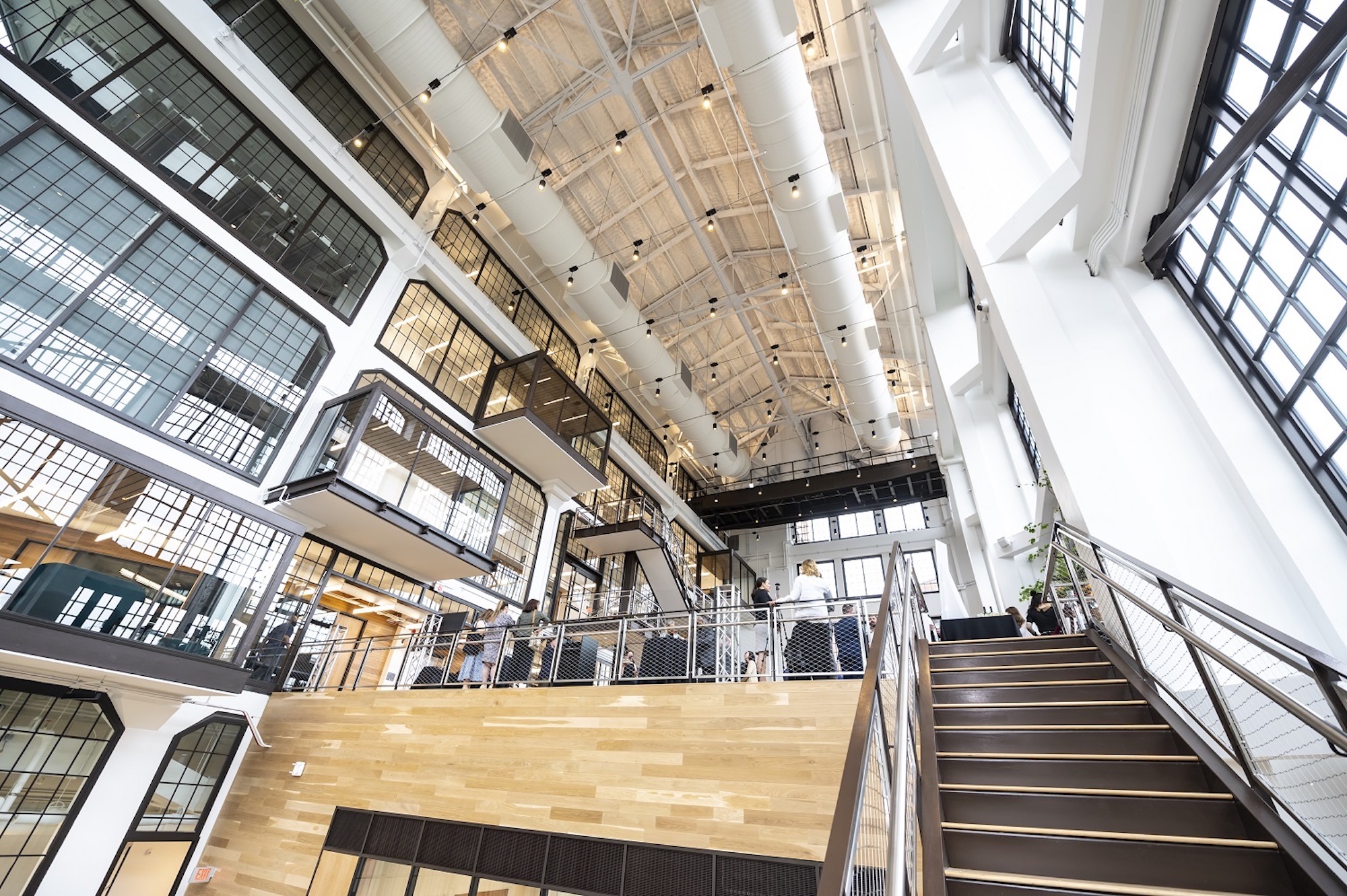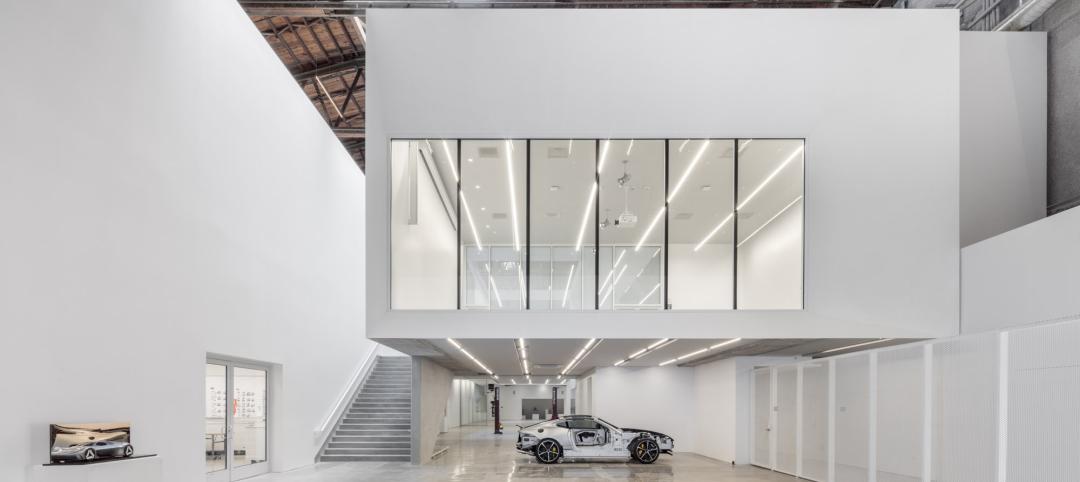Today, The Assembly is a state-of-the-art life sciences research and innovation facility. But the century-old building began as a Model-T assembly line and showroom for the Ford Motor Company in the Bloomfield neighborhood of Pittsburgh.
Developed by Wexford Science & Technology, The Assembly opened earlier this year and more recently achieved LEED Gold certification for its design, construction, and operations practices, which focused on improving environmental and human health. The Assembly is the University’s 18th project to earn a LEED certification since 2005, when it received its first LEED Gold certification for the McGowan Institute of Regenerative Medicine.
The newest LEED Gold certification aligns with the school’s and the community’s larger sustainability efforts, including the Plan for Pitt, the Pitt Sustainability Plan, and a commitment to third-party certified green buildings. The university intends to reach carbon neutrality both on- and off-campus by 2037.
Designed by ZGF and built by Turner Construction, The Assembly diverted nearly 90% of construction waste from the landfill. Of its renovation materials, 56% were regional and 32% recycled. Close to public transit, The Assembly provides bicycle storage and changing rooms, as well as 30 electric vehicle chargers.
The Assembly is part of a 355,000-sf life science redevelopment complex in the former Ford plant. The research taking place at The Assembly includes cancer biology and immunology, among other areas.
Constructed in 1915, the Ford Motor Company Assembly Plant housed Model-T production, showroom, and sales until 1932. As a dealership, it remained in business until 1953, then sat largely vacant. In 2018, the original building was named to the National Register of Historic Places, and the University of Pittsburgh and Wexford acquired the property and announced redevelopment plans.
On the Building Team:
Developer: Wexford Science & Technology
Capital partner: Ventas
Design architect and architect of record: ZGF Architects
MEP engineer: AEI
Structural engineer: Thornton Tomasetti
Construction: Turner Construction
Related Stories
Education Facilities | Aug 4, 2024
A former supersonic wind tunnel becomes a new educational facility for transportation design
The Mullin Transportation Design Center at ArtCenter College of Design in Pasadena, Calif., provides access for full-scale vehicular models, replicating a professional design studio.
Adaptive Reuse | Jul 30, 2024
Empty mall to be converted to UCLA Research Park
UCLA recently acquired a former mall that it will convert into the UCLA Research Park that will house the California Institute for Immunology and Immunotherapy at UCLA and the UCLA Center for Quantum Science and Engineering, as well as programs across other disciplines. The 700,000-sf property, formerly the Westside Pavilion shopping mall, is two miles from the university’s main Westwood campus. Google, which previously leased part of the property, helped enable and support UCLA’s acquisition.
Great Solutions | Jul 23, 2024
41 Great Solutions for architects, engineers, and contractors
AI ChatBots, ambient computing, floating MRIs, low-carbon cement, sunshine on demand, next-generation top-down construction. These and 35 other innovations make up our 2024 Great Solutions Report, which highlights fresh ideas and innovations from leading architecture, engineering, and construction firms.
Adaptive Reuse | Jul 12, 2024
Detroit’s Michigan Central Station, centerpiece of innovation hub, opens
The recently opened Michigan Central Station in Detroit is the centerpiece of a 30-acre technology and cultural hub that will include development of urban transportation solutions. The six-year adaptive reuse project of the 640,000 sf historic station, created by the same architect as New York’s Grand Central Station, is the latest sign of a reinvigorating Detroit.
MFPRO+ News | Jun 24, 2024
‘Yes in God’s Backyard’ movement could create more affordable housing
The so-called “Yes in God’s Backyard” (YIGBY) movement, where houses of worship convert their properties to housing, could help alleviate the serious housing crisis affecting many communities around the country.
Multifamily Housing | Jun 14, 2024
AEC inspections are the key to financially viable office to residential adaptive reuse projects
About a year ago our industry was abuzz with an idea that seemed like a one-shot miracle cure for both the shockingly high rate of office vacancies and the worsening housing shortage. The seemingly simple idea of converting empty office buildings to multifamily residential seemed like an easy and elegant solution. However, in the intervening months we’ve seen only a handful of these conversions, despite near universal enthusiasm for the concept.
Adaptive Reuse | Jun 13, 2024
4 ways to transform old buildings into modern assets
As cities grow, their office inventories remain largely stagnant. Yet despite changes to the market—including the impact of hybrid work—opportunities still exist. Enter: “Midlife Metamorphosis.”
Adaptive Reuse | Jun 6, 2024
Latest phase of London redevelopment completes two new buildings
Developers are creating a neighborhood for 25,000 residents and workers.
MFPRO+ News | Jun 3, 2024
New York’s office to residential conversion program draws interest from 64 owners
New York City’s Office Conversion Accelerator Program has been contacted by the owners of 64 commercial buildings interested in converting their properties to residential use.
Adaptive Reuse | May 15, 2024
Modular adaptive reuse of parking structure grants future flexibility
The shift away from excessive parking requirements aligns with a broader movement, encouraging development of more sustainable and affordable housing.

















